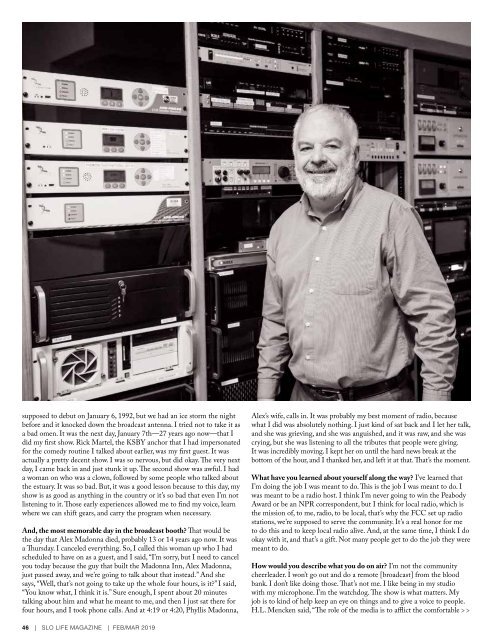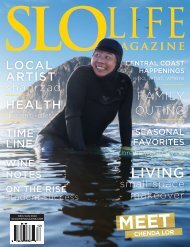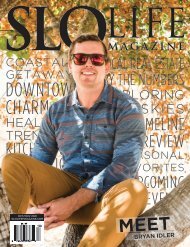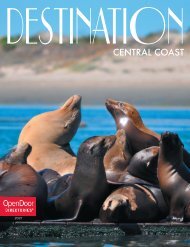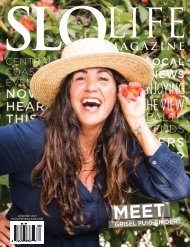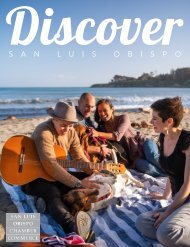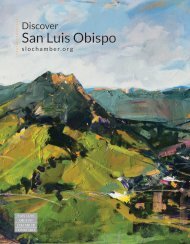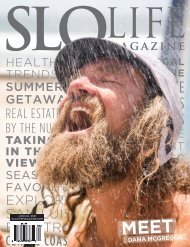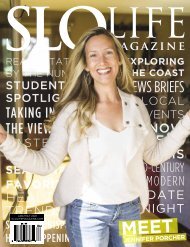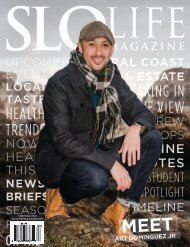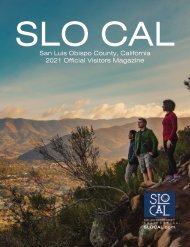You also want an ePaper? Increase the reach of your titles
YUMPU automatically turns print PDFs into web optimized ePapers that Google loves.
supposed to debut on January 6, 1992, but we had an ice storm the night<br />
before and it knocked down the broadcast antenna. I tried not to take it as<br />
a bad omen. It was the next day, January 7th—27 years ago now—that I<br />
did my first show. Rick <strong>Mar</strong>tel, the KSBY anchor that I had impersonated<br />
for the comedy routine I talked about earlier, was my first guest. It was<br />
actually a pretty decent show. I was so nervous, but did okay. The very next<br />
day, I came back in and just stunk it up. The second show was awful. I had<br />
a woman on who was a clown, followed by some people who talked about<br />
the estuary. It was so bad. But, it was a good lesson because to this day, my<br />
show is as good as anything in the country or it’s so bad that even I’m not<br />
listening to it. Those early experiences allowed me to find my voice, learn<br />
where we can shift gears, and carry the program when necessary.<br />
And, the most memorable day in the broadcast booth? That would be<br />
the day that Alex Madonna died, probably 13 or 14 years ago now. It was<br />
a Thursday. I canceled everything. So, I called this woman up who I had<br />
scheduled to have on as a guest, and I said, “I’m sorry, but I need to cancel<br />
you today because the guy that built the Madonna Inn, Alex Madonna,<br />
just passed away, and we’re going to talk about that instead.” And she<br />
says, “Well, that’s not going to take up the whole four hours, is it?” I said,<br />
“You know what, I think it is.” Sure enough, I spent about 20 minutes<br />
talking about him and what he meant to me, and then I just sat there for<br />
four hours, and I took phone calls. And at 4:19 or 4:20, Phyllis Madonna,<br />
Alex’s wife, calls in. It was probably my best moment of radio, because<br />
what I did was absolutely nothing. I just kind of sat back and I let her talk,<br />
and she was grieving, and she was anguished, and it was raw, and she was<br />
crying, but she was listening to all the tributes that people were giving.<br />
It was incredibly moving. I kept her on until the hard news break at the<br />
bottom of the hour, and I thanked her, and left it at that. That’s the moment.<br />
What have you learned about yourself along the way? I’ve learned that<br />
I’m doing the job I was meant to do. This is the job I was meant to do. I<br />
was meant to be a radio host. I think I’m never going to win the Peabody<br />
Award or be an NPR correspondent, but I think for local radio, which is<br />
the mission of, to me, radio, to be local, that’s why the FCC set up radio<br />
stations, we’re supposed to serve the community. It’s a real honor for me<br />
to do this and to keep local radio alive. And, at the same time, I think I do<br />
okay with it, and that’s a gift. Not many people get to do the job they were<br />
meant to do.<br />
How would you describe what you do on air? I’m not the community<br />
cheerleader. I won’t go out and do a remote [broadcast] from the blood<br />
bank. I don’t like doing those. That’s not me. I like being in my studio<br />
with my microphone. I’m the watchdog. The show is what matters. My<br />
job is to kind of help keep an eye on things and to give a voice to people.<br />
H.L. Mencken said, “The role of the media is to afflict the comfortable >><br />
46 | <strong>SLO</strong> <strong>LIFE</strong> MAGAZINE | FEB/MAR <strong>2019</strong>


